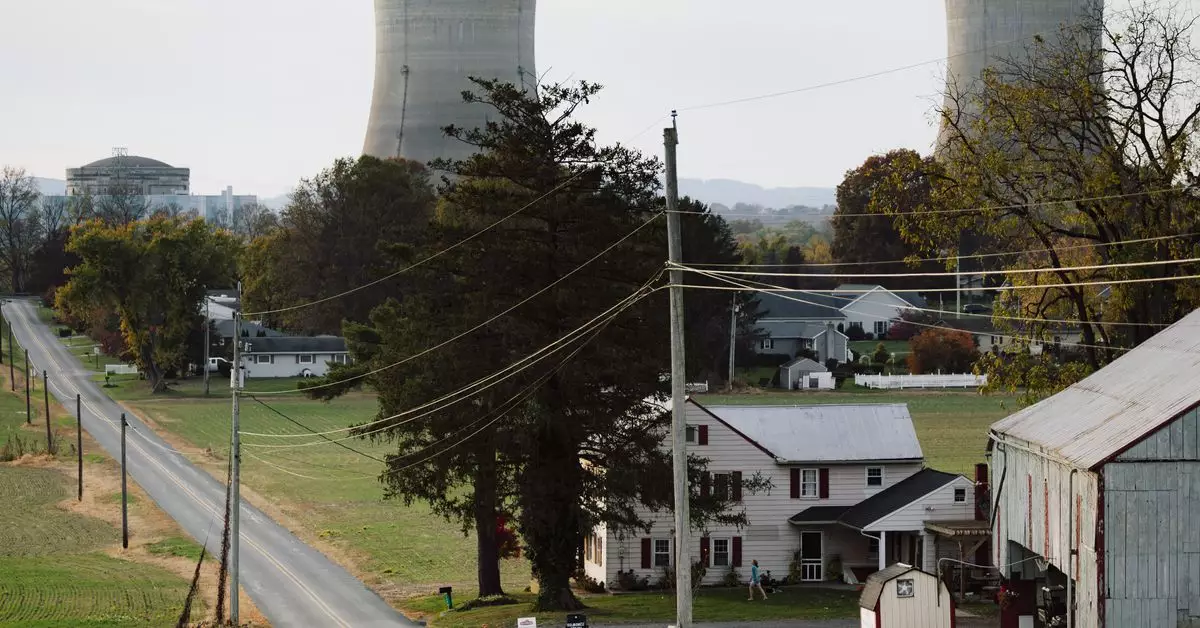In a significant shift toward sustainable energy solutions, the General Services Administration (GSA) recently entered into an impressive 10-year, $840 million contract to procure nuclear energy. This groundbreaking agreement underscores the increasing reliance on nuclear power — a trend that is gaining momentum not just among tech giants but also at the federal level. The GSA’s announcement follows a series of nuclear deals struck by major corporations in the technology sector, signaling a notable change in the energy procurement landscape.
The substantial contract includes a commitment to deliver 10 million megawatt-hours of electricity—enough to power over one million households annually. Constellation, which operates the largest nuclear fleet in the United States, has been awarded this contract. The GSA revealed that approximately 4 million megawatt-hours of energy from nuclear sources will be integrated into this vast supply, a noteworthy contribution to the agency’s overall energy strategy. Interestingly, this initiative appears not just as a malleable response to energy consumption challenges but as a strategic partnership that could energize the revitalization of the nuclear sector in the United States.
The increased demand for electricity, particularly from Artificial Intelligence (AI) data centers, has put pressure on finding sustainable and reliable energy sources. Silicon Valley’s pivot toward nuclear energy is particularly indicative of a broader trend where cutting-edge technology and essential infrastructure must align with environmental concerns. According to Constellation’s president and CEO, Joe Dominguez, this agreement marks a critical turning point. Historically, nuclear power was overlooked in many sustainable energy procurement strategies. However, changing governmental vigor toward embracing innovative yet reliable energy options reflects a seismic shift in perspective.
The GSA’s contract not only demonstrates a push for cleaner energy but also illustrates the federal government’s pivotal role as the largest energy consumer in the nation. This substantial commitment from the GSA may very well fortify the nuclear industry further by confirming its viability in both corporate and governmental energy strategies, which is crucial given the global urgency in addressing climate change.
Constellation has committed to generating 10% of the nation’s carbon emission-free energy, primarily through its nuclear operations. While the company diversifies through hydro, wind, and solar energy, its vision encompasses a total conversion to carbon-free energy by 2040—an ambitious objective. This new partnership potentially fortifies this vision, as the GSA’s procurement locks in a cost-competitive and reliable energy supply, thereby ensuring that the nuclear initiative can contribute meaningfully to the objective of reducing overall carbon footprints.
In tandem with this deal, licensing extensions for existing nuclear plants will finance new technological investments aimed at adding an impressive 135 megawatts of capacity. Significantly, the GSA’s participation is not limited to its facilities; various federal departments, including Veterans Affairs and the National Park Service, stand to gain from this contract. The breadth of governmental commitment reaffirms the strategic importance of nuclear energy in the U.S. energy portfolio.
Future Implications for Energy Pricing and Demand
This contract not only stabilizes energy costs but also paves the way for budgetary predictability amid rising electricity demands driven largely by data centers and AI technologies. With escalating competition for clean energy sources, securing a stable price over ten years becomes a tactical advantage for federal agencies, empowering them to manage their energy budgets effectively. As such, this agreement holds far-reaching implications, reinforcing the argument for proactively investing in nuclear energy as a cornerstone of the nation’s strategy to combat rising energy prices and demands.
Moreover, this contract follows a pattern established by tech behemoths like Microsoft, Google, and Amazon, who have all begun forging nuclear energy deals in the past year. Microsoft’s intended resurrection of a nuclear reactor at Three Mile Island—a site historically associated with the worst nuclear accident in the United States—exemplifies the evolving narrative around nuclear power, steering it away from past stigmas and towards a more sustainable future.
The Role of Government in Energy Evolution
The Biden administration’s commitment to integrating nuclear energy into the nation’s energy blueprint highlights a comprehensive approach to transforming energy policies aimed at mitigating climate change. The recent loan from the Department of Energy to support the restart of a retired nuclear station further encapsulates the strategic importance of nurturing this sector.
The GSA’s monumental contract with Constellation marks a transformative moment for the nuclear energy landscape. As this industry evolves to meet modern energy demands, the federal government plays a critical role in navigating the complexities of energy procurement. The future of energy in the U.S. is poised for significant growth in nuclear capabilities, with sustainable commitments being integral to the larger narrative of energy independence and climate action.


Leave a Reply